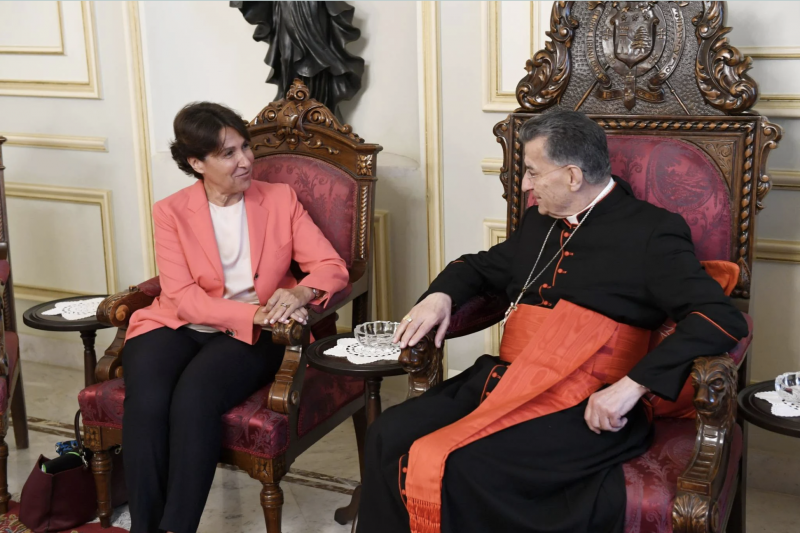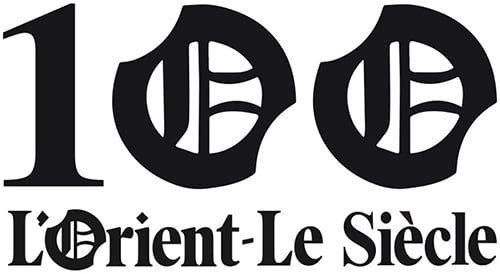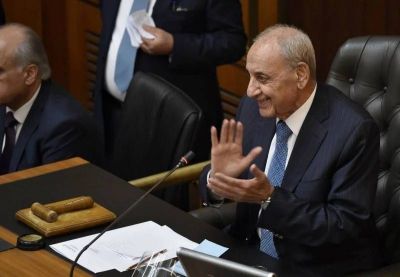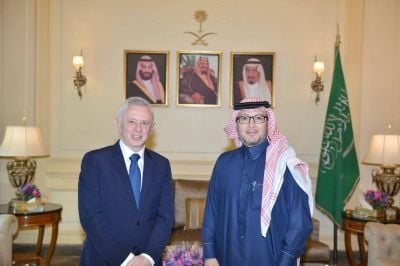
French Ambassador Anne Grillo with Patriarch Bechara Rai in Bkirki. (Courtesy of the official website of the Maronite Church)
Has France changed its stance on Lebanon’s presidential election?
Paris has long believed the only viable option to break the presidential deadlock was the election of Sleiman Frangieh, the Hezbollah-endorsed candidate.
France implicitly supported a deal that would see the presidency go to Frangieh and the post of prime minister go to Nawaf Salam, a judge at the International Criminal Court who is close to the opposition.
According to some observers, however, France has given up on this proposal.
Was their pivot in response to growing discontent among Lebanon’s Christian parties?
New Saudi position
Marada Movement leader Sleiman Frangieh is “no longer a viable option” for France, according to Firas Maksad, a US-based Lebanese researcher who quoted a senior French official via Twitter on May 9.
Although he did not specify his source, Maksad seemed to be announcing out loud what has been rumored for several days in Lebanese political corridors.
The French Embassy in Lebanon, however, did not wish to comment.
For several months now, France has been proposing a “realistic” swap between the posts of president and prime minister.
But this proposal failed to convince Riyadh, which remained committed to the plan agreed upon by France, the US, Saudi Arabia, Qatar and Egypt in Paris on Feb.6.
These countries called for the election of a consensus president who would not pose a challenge to any stakeholders.
During a tour with various political actors last week, Saudi Ambassador to Lebanon Waleed Bukhari announced that the kingdom would not oppose any candidate agreed upon by the Lebanese.
Some observers — including those in the Hezbollah camp — interpreted this position as a sign of a more lenient stance, but the Zgharta strongman remains far from the subject of a broad compromise. This is especially true because the two major Christian parties, the Lebanese Forces (LF) and the Free Patriotic Movement (FPM), continue to oppose his candidacy.
Without the support of at least one of these two major Christian camps, Frangieh’s presidential ambitions are doomed.
First, the Marada leader lacks “Christian legitimacy” because the position of the presidency is traditionally reserved for a Christian. Second, with the help of other opposition factions, the two Christian parliamentary groups can boycott the vote.
This situation seems to have prompted Paris to reconsider its approach.
“The French approach to the crisis in Lebanon, especially in the presidential matter, differs from the position of the Maronite Church,” a source close to the Maronite Patriarch Bechara al-Rai told L’Orient-Le Jour.
“There is a group within the French political leadership that has a vision for Lebanon’s future that does not convince us,” the source added.
However, the same source said Bkirki has no veto power over any candidate, although the Maronite Church has been calling for the election of a consensus president “above political parties.”
“A debate on these differences took place during the last meeting between the patriarch and [French] Ambassador Anne Grillo, who assured that France does not support any specific candidate,” the Bkirki source added.
According to press reports, Patriarch Rai may visit Paris to discuss the presidential issue with French President Emmanuel Macron.
“The French have realized that their stance is detrimental to the Christians, the opposition, and even their reputation in Lebanon,” said LF spokesperson Charles Jabbour. “They can no longer spearhead Frangieh’s campaign.”
Passive aggression
The pertinent question, however, remains: Did the French reverse their stance while Paris was trying to convince Riyadh of its proposal?
“If this information is confirmed, it would mean that Saudi policy regarding the presidential elections was passive-aggressive; the kingdom did not openly attempt to sabotage the French proposal but preferred not to respond to it [by] allowing the Frangieh project to collapse on its own,” explained Michael Young, editor of Diwan, a publication of the Malcolm H. Kerr Carnegie Middle East Center.
“The Saudi approach was not to create a crisis with the French, but simply not to approve their proposal and let it die on its own,” added Young.
According to many observers, the Americans also opposed Paris’ approach.
To convey this message, the US State Department issued a communiqué in early May calling for the election of a Lebanese president to unite the country and implement necessary reforms.
Faced with opposition at both the local and international levels, France may have decided to reduce its support for Frangieh’s candidacy while not necessarily completely abandoning it, especially in the absence of a clear alternative.
Supporters of the Marada leader, however, dismissed reports of French withdrawal.
“It is an orchestrated campaign against our candidate. How could the positive signals from Saudi Arabia discourage France?” a source close to Frangieh told L’Orient-Le Jour on condition of anonymity, adding that he expects Bukhari to pay a visit to Zgharta next week.
But how to explain Hezbollah’s aggressive new tone?
Hezbollah’s no. 2 man, Naim Kassem, said in a Tuesday press statement that the Parliament votes in favor of Frangieh are significant and could increase further.
“The opposing camp stands almost no chance, due to its fragmentation. Compared to our preferred candidate, there is a list of about 10 names that are far behind,” the source added.
Kassem Kassir, an analyst close to Hezbollah, acknowledged that Frangieh’s candidacy is precarious.
“Paris doesn’t want to alienate Christians in Lebanon,” said Kassir.
“This doesn’t necessarily mean that the French have abandoned Frangieh. They’re just waiting to see how things unfold in Lebanon and abroad. As Waleed Bukhari said, the ball is in the Lebanese camp.”
This article was originally published in French in L'Orient-Le Jour. Translation by Sahar Ghoussoub.




commentaires (0)
Commenter